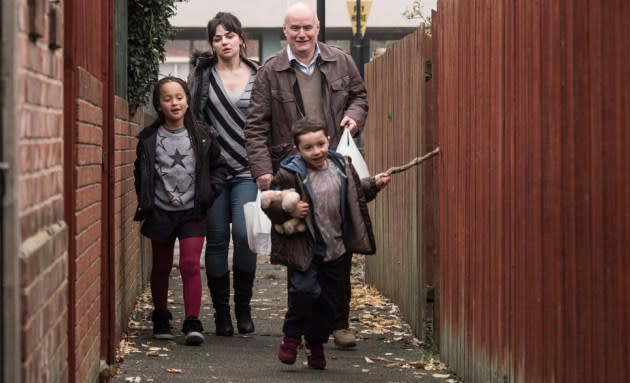‘I, Daniel Blake’ Producer Rebecca O’Brien Says UK Indie Film Sector Will “Die” Without “Additional Fiscal Support”
- Oops!Something went wrong.Please try again later.

“There’s market failure because the streamers came in, high-end TV got higher end, and Hollywood arrived. And they took a lot of our investors away,” Sixteen Films producer Rebecca O’Brien concluded when quizzed on the state of the UK indie film sector during an appearance at the UK’s British Film & High-End TV Inquiry.
She added: “Some additional fiscal support for the sector is essential. I think we could really die without it.”
More from Deadline
O’Brien appeared in front of the bipartisan committee this morning, where she discussed her decades-long experience producing features with Ken Loach, navigating the independent market of international co-productions and financing, and what must change for the UK indie industry to push forward.
The session began with O’Brien being asked how she and her team at Sixteen Films have managed to successfully produce and land distribution for the films of the company’s founder, Ken Loach.
“When we made I, Daniel Blake, for instance, we didn’t know that it would be successful in Japan. We thought we were making a little film set in the northeast, which was telling stories about certain parts of the community at that time,” she said.
“We wanted to make it because we thought it was an important story to tell. So you never know what story might work. You don’t know until you’ve done it, which is why we need the research and development to get stories up and running.”
O’Brien added that the work Sixteen Films has completed has been highly dependent on their European partners, who she said have been integral in financing and selling projects across the world. The company has produced many of its recent films with Vincent Maraval’s Goodfellas (formerly Wild Bunch) and the Paris-based Why Not Productions.
“Every film I have done in the last 25 years has been a European co-production,” she said before adding that it has become much harder, in recent years, to source funding from the continent. O’Brien articulated her point by referring to Harvest, her latest production credit directed by Athina Rachel Tsangari and starring Caleb Landry Jones.
“I’ve had to go scour Europe to get the funding for the film. We were unable to raise money from the U.S.,” she said.
“It stars an ensemble of British actors and one American. All new talent and it’s set in a medieval Village at some point in the past, and it’s a week in the life of this community where a stranger arrives and things go horribly wrong. So that’s the story, but to make this film it’s a UK, French, German, Greek, and U.S. co-production, with little bits of money patchworked together from all of those different countries from their public funds, pre-sales, and little tax credits here and there.”
O’Brien said the production also has private investors alongside cash from Creative Scotland and BBC Film.
“It’s absolutely exhausting to put something like that together. If we had an enhanced tax credit, for instance, I wouldn’t have had to defer my fee. We would have been in a position where we can now finish the film with confidence. But it’s been a real struggle just because we haven’t quite got enough money to do it.”
Cash and public funding were two prominent talking points throughout the session, alongside the development of new British talent within the film and high-end TV space.
“There is a market failure because where inward investment has been incredibly successful for this country, it’s also taken away a lot of talent. It’s hoovered up them, and we have to keep running behind and picking up new talent, inventing new talent to fill the gap, which we’re very happy to do,” O’Brien said.
“But a lower budget film can’t afford to have big British stars because they’re all probably scheduled within an inch of their lives working on Hollywood films at Pinewood. So that is a problem.”
O’Brien added that indie UK productions simply “cannot afford to pay what the streamers pay and what the inward investors can pay their actors and crew.”
The I, Daniel Blake, and Sorry We Missed You producer concluded that the British government could “show confidence” in the UK indie sector by supporting producers with an increased tax credit.
“If I had an additional 15% going into the market, that would give me more confidence,” she said.
“It gives me the confidence to say to investors, ‘Look here, I’ve got 40-45% of the budget. You’re only going to have to come up with 10%.’ It makes me it gives me broad shoulders. It makes me less subservient to the money. It makes me more confident with my projects and ideas, and say, I‘ve got this great idea, and this is how we can fund it.”
O’Brien added that she believes a higher incentive for producers would “bring private investment more happily to the table” because “they’re taking less of a risk.”
“I think that’s how it works,” she said.
In his last budget, UK Chancellor Jeremy Hunt announced plans to reform the film and TV relief from a rebate of 25% to a new “expenditure credit” of 34%. The change was set from January 2024 and represents a 0.5% real-terms increase in the tax break.
Best of Deadline
TV Cancellations Photo Gallery: Series Ending In 2024 & Beyond
2024 Premiere Dates For New & Returning Series On Broadcast, Cable & Streaming
The CDGA Awards Photos: The Best Of The Red Carpet & Gala Ceremony
Sign up for Deadline's Newsletter. For the latest news, follow us on Facebook, Twitter, and Instagram.
